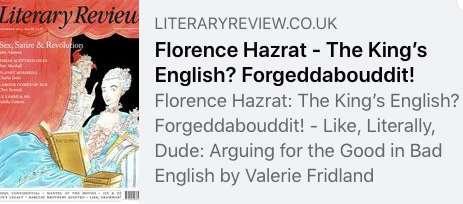good things about 'bad' english
Here's an article reviewing a book about our prejudices against (some) non-standard Englishisms.
Think of intensifiers like ‘totally’, ‘pretty’ and ‘completely’. We might consciously believe them to be exaggerations undermining the speaker’s point, yet people consistently report seeing linguistic booster-users as more authoritative and likeable than others.
Interesting! I'd like to see more data on that.
It's a good review, and this looks like an interesting book. However:
Fridland does well to burst the bubble of mockery around Californian girls’ vocal fry (think the creaking voices of Paris Hilton and the Kardashians), unpicking the social meanings we attach to verbal patterns we find unacceptable. We tend to dislike (and believe reprehensible) what we’re not regularly exposed to. And that often happens to be the language of vulnerable communities, such as black and brown people, teenagers and women.
... except that vocal fry is all over, and always has been. Sean Connery's James Bond famously introduced himself with Fry ... Vocal Fry. In fact, privileged English men were all vocal fry for a good several 20th-century decades. And they were never excoriated for it.
So either the author or the reviewer has it partially right: this really is mostly about our feelings about the people doing it. But it's not at all about what we're "not regularly exposed to." We've all been regularly exposed to vocal fry all our lives.

Comments